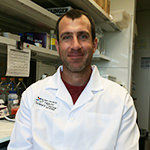In Press: Joseph Valentine Co-First Author Paper Was Accepted by Aging Cell!

 Congratulations to one of our students Joseph Valentine in the Biology of Aging discipline of the Integrated Biomedical Sciences program whose co-first author paper has been accepted by Aging Cell and is currently in press. Valentine is in the lab of Dr. Nicolas Musi at the Barshop Institute for Longevity and Aging.
Congratulations to one of our students Joseph Valentine in the Biology of Aging discipline of the Integrated Biomedical Sciences program whose co-first author paper has been accepted by Aging Cell and is currently in press. Valentine is in the lab of Dr. Nicolas Musi at the Barshop Institute for Longevity and Aging.
The paper is entitled “Sustained NF-kB inhibition improves insulin sensitivity but is detrimental to muscle health.”
Valentine explained that this achievement has been exciting for him because he is able to share his work with the community.
“Every day that I go to lab I am excited because I know that I will learn something new about skeletal muscle biology and it is very rewarding when I have a chance to share my findings with the scientific community,” he said.
Valentine’s project researches sarcopenia, which is the loss of muscle mass and strength as we age. Specifically, he is interested in the relationship between elevated inflammation and sarcopenia which occurs at the same time during aging in mice and humans.
“My lab and others have also shown that as we age there is an increase in inflammation within the muscle itself. This skeletal muscle inflammation is not a result of infection and is much much less intense than that which occurs during an infection,” he explained. “Inflammation of this magnitude has been shown to play a role in muscle wasting due to pathological conditions (cancer induced muscle loss or disuse/denervation).”
His project tested whether reducing inflammation could protect mice from sarcopenia and his results were surprising.
“We genetically suppressed inflammation in the skeletal muscle of mice and found, unexpectedly, that this resulted in even greater loss of muscle mass and function during aging compared to just normal mouse aging,” he explained. “These findings suggest to us that the mechanisms or reasons for the loss of muscle mass and function during aging are different than those of pathological muscle wasting.”
Valentine explained that he has learned a lot from this experience of being co-first author on a publication.
“It is exciting working on a project, which resulted in the acquisition of data worthy of sharing first authorship on a publication. I learned that there is a lot more to being a good scientist then just the accumulation of good data. That is an important part of science for sure but if you cannot communicate and interpret your data in a meaningful and cogent way then you cannot share it with the community,” he said.
Valentine explained that the key to his success was making sure that his experiments were well designed with proper controls and extreme attention to detail so that he was confident in his data, regardless of whether they support his hypothesis or not.
Valentine’s next goal is to understand why reducing inflammation in the skeletal muscle of mice leads to an early life sarcopenia-like phenotype.
